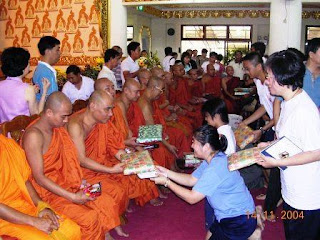Daily Perfections
The reason why this set was put together, some years after the Buddha passed away, seems to have been that Buddhists speculated on why this one person arose in the world who surpassed all toehr in the depth and range of his wisdom.
Many of his disciples developed qualities that the Buddha had manifested and also crossed over to the Other Shore but none came close to the Buddha in terms of depth, range and versatility in presenting the Dhamma. And unlike his disciples, he realized the path without a teacher. So people reckoned that this unique person must have interited a huge stock of strengths and virtues in the process of many lifetimes.
Stories and fables were created to describe this process whereby the Future Buddha (Bodhisatta or Bodhisattva) developed parami as foundation for his future enlightenment (or awakening). Different schools of Buddhism selected different qualities to be parami, but in the school that came to be called Threvada, then were so designated. Theravada uses the Pali language, referring to them as parami, whereas other schools use the classical Sanskrit language, hence paramita. The ten parami are:
Generosity - Dana
Morality - Sila
Renunciation - Nekkhamma
Discernment or Wisdom - Panna
Energy - Viriya
Patience - Khanti
Truthfulness - Sacca
Resolve - Adhitthana
Kindness - Metta
Equanimity - Upekkha
These parami form a set of themes that are used in the Theravada tradition to this day. They provide a template for the mind's energies and activities that is not an extra to all the other things we might have to do, but encompasses our talking and working, our relationship and interactions with others, our times of private introspection, our decision-making and the forming of our life directions.
We practice morality, patience and all or an of the rest while we are engaged at work or minding the children, or stuck in a traffic congestion. When it comes down to it, why not? When you are in a middle of a jam, you can either get irritable, full of worries or you can practice patience. So which is going to take you out of stress right now? You get the picture.
The parami take spiritual practice into areas of our lives where we got confused, are subject to social pressure and are often strongly influenced by stress or stress-forming assumptions. Providing alternative ways and means to orient the mind in the stream of daily events, the "perfections" can derail obstructive inner activities and make the mind clear.
Cultivating parami means you get to steer your life out of the floods.
Many of his disciples developed qualities that the Buddha had manifested and also crossed over to the Other Shore but none came close to the Buddha in terms of depth, range and versatility in presenting the Dhamma. And unlike his disciples, he realized the path without a teacher. So people reckoned that this unique person must have interited a huge stock of strengths and virtues in the process of many lifetimes.
Stories and fables were created to describe this process whereby the Future Buddha (Bodhisatta or Bodhisattva) developed parami as foundation for his future enlightenment (or awakening). Different schools of Buddhism selected different qualities to be parami, but in the school that came to be called Threvada, then were so designated. Theravada uses the Pali language, referring to them as parami, whereas other schools use the classical Sanskrit language, hence paramita. The ten parami are:
Generosity - Dana
Morality - Sila
Renunciation - Nekkhamma
Discernment or Wisdom - Panna
Energy - Viriya
Patience - Khanti
Truthfulness - Sacca
Resolve - Adhitthana
Kindness - Metta
Equanimity - Upekkha
These parami form a set of themes that are used in the Theravada tradition to this day. They provide a template for the mind's energies and activities that is not an extra to all the other things we might have to do, but encompasses our talking and working, our relationship and interactions with others, our times of private introspection, our decision-making and the forming of our life directions.
We practice morality, patience and all or an of the rest while we are engaged at work or minding the children, or stuck in a traffic congestion. When it comes down to it, why not? When you are in a middle of a jam, you can either get irritable, full of worries or you can practice patience. So which is going to take you out of stress right now? You get the picture.
The parami take spiritual practice into areas of our lives where we got confused, are subject to social pressure and are often strongly influenced by stress or stress-forming assumptions. Providing alternative ways and means to orient the mind in the stream of daily events, the "perfections" can derail obstructive inner activities and make the mind clear.
Cultivating parami means you get to steer your life out of the floods.




Comments